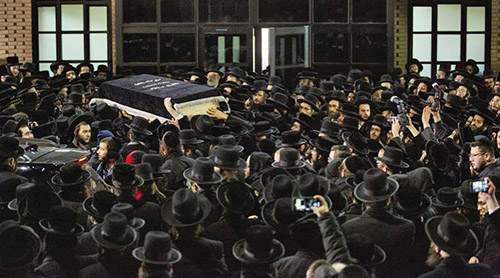

(Courtesy of OHEL) The horrific events in Jersey City were sprawled across the news and media. Scenes abound of shoot outs and heavily armored emergency personnel rushing to the scene. While all this was transpiring and afterwards, the OHEL trauma team was quietly but busily at work assuring the emotional healing and well-being of those exposed to the carnage and potential threat to life.
Among the first on the scene were five members of OHEL’s Williamsburg trauma team who received instruction on responding to catastrophic events in the weeks before. These volunteers stayed with family members of victims and witnesses and provided “psychological first aid” to the students while on lock-down. Throughout the day, they were in phone contact with Dr. Blumenthal, OHEL’s director of trauma and crisis services.
Much of the hidden but essential work followed the initial interventions. As soon as the children returned to school, two members of a new partner organization with OHEL, Hameir, from New Square, New York, were on hand as the children arrived. Working closely with the administration and teachers, these fluent Yiddish-speaking professionals trained by OHEL spent an entire day at the school meeting with individuals and groups. “The sensitivity and creativity of these trauma professionals not only reflected but surpassed the training provided,” said Dr. Blumenthal. “They deftly integrated the psychological know-how with a personal and intimate familiarity with Chasidus providing a language and context for managing the trauma and its sequelae.”
Simultaneously, two female OHEL first responders fluent in Yiddish met with many of the mothers of these children in another setting ensuring that the coping and narrative being developed at the school corresponded to what was conveyed in their homes. These professionals returned two days later to continue the work with family members in group and individual settings.
Subsequently, two women from Hameir trained by Tzivy Reiter, OHEL’s director of children’s services, spent several hours with girls from the community who also witnessed the destabilizing occurrences of that dreaded day. It was unequivocally evident that they too needed help processing what was witnessed and reclaiming a personal sense of safety and predictability.
“What was particularly encouraging,” said David Mandel, OHEL CEO, “was having at our disposal trained members of the chasidic community and fluent in Yiddish to blend evidence-based psychological interventions with the vocabulary and cultural context of the community.” Noting the continued requests for more assistance and support, Mandel acknowledged that OHEL’s work for Jersey City and any traumatized member of the larger community is far from over. “We’ve also been approached by Spanish-speaking members of the broader Jersey City community for assistance and are in the process of putting that in place with comparably culturally familiar and fluent professionals for those traumatized by the unthinkable violence of that day.”
For more information on OHEL’s services in trauma, crisis and grief as well as its broad array of services, please contact OHEL ACCESS: 1-800-603-OHEL or email [email protected].









